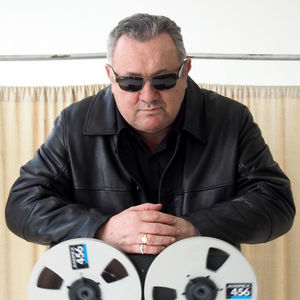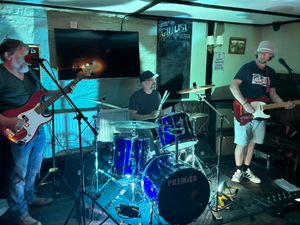Telling a tale of tainted love: Soft Cell's Dave Ball to release autobiography
Best known as the brain behind Soft Cell’s synth-driven sound, producer Dave Ball is releasing an autobiography.

Sometimes it’s the quiet ones who have the best stories.
And in the case of Dave Ball, Soft Cell’s gruff multi-instrumentalist and synth player, this couldn’t be more true.
“It’s always the singer that gets the most attention,” quips a jovial Ball down the phone from his London home.
Everyone knows the tale of Marc Almond, Soft Cell’s flamboyant and provocative frontman.
He recounted it in detail in his 1999 tell-all memoir Tainted Life.
But what of the man behind the music?
The man responsible for the urgent synthesiser stabs of 1981 hit Tainted Love?
“I’ve tried to be as honest as I can,” Ball explains in a deep, warm growl.
“But for legal reasons there’s some things that had to be removed by the department at the publishers
“They’re the more salacious stories anyway – so they’d never get published.”
Ball, now 61, finally tells his part in Electronic Boy: My Life In And Out Of Soft Cell.Born in Chester in 1959 and raised in Blackpool, he topped the charts with Soft Cell before embarking on a varied career as a producer and remixer for the likes of David Bowie and Kylie Minogue.
Ball is camped out at his London home and, by his own admission, hasn’t been more than 100 yards away since lockdown began in March.
He has a lung condition and has limited himself to park trips and jaunts to the cornershop.
“I’m self-isolating - or self-oscillating, as I like to call it,” he chuckles.
The autobiography follows his musical evolution through Marc Bolan and David Bowie, punk rock, Kraftwerk and Northern Soul. It is a searingly honest memoir that recounts his introduction to Northern Soul music at the Blackpool Casino, and a chance meeting with a punky second-year art student wearing gold lame jeans at Leeds Polytechnic in 1977.
Soon Ball and Almond – one of pop’s great Odd Couples – were exploring the underbelly of London’s Soho and penning electronic odes of the gutter life.
In their short five-year career, Soft Cell burned bright and fast.
Their platinum-selling debut album Non-Stop Erotic Cabaret explored a seedy world of drugs, bedsits and all-night raves.
It spawned the single Tainted Love, a cover of the Gloria Jones soul stomper, which topped the charts worldwide and shot Soft Cell to international fame.
But neither Ball nor Almond were ready.
“It was all very weird and extreme,” he recalls.
“From living in a council flat - it was a housing estate flat - and suddenly you’re flying on Concorde to New York.
“And then flying back from New York and going back to your housing estate flat that had had the locks glued by jealous neighbours.”
Soft Cell were gaining momentum but both Ball and Almond had other ideas.
“We decided we didn’t want to be commercially successful,” he adds with a conspiratorial edge.
“We were sick of that lifestyle.
“We wanted to be more serious and obviously commercially that’s suicide.
“Our commercial instincts were never in tune with the record company,” he laughs.
A substantial portion of Electronic Boy recounts Ball’s narcotic adventures, which spiralled when he and Almond visited New York for the first time.
“We got caught up in it, which a lot of people do, but we wanted to because our heroes were The Velvet Underground, Suicide and the New York Dolls,” he said.
“So when we got to New York we just wanted to experience that life.
“We went into it with our eyes wide open - lets have a go, let’s push it as far as we can.
“We both have always been very extreme about things, we never do anything by half, so just push it as far as it can go and see what happens.
“Luckily we came out on the other side of the tunnel - it could have easily gone wrong.”
Amid the drugs and late nights, cracks began to show.
Although Soft Cell never ended for good, they went their separate ways in 1984.
Almond went on to work with Jools Holland, Coil and Berlin-based composer Michael Cashmore.
After releasing a solo album, In Strict Tempo, Ball took a left turn and went on the road with the provocative art and music outfit Psychic TV.
“I went back to my artistic roots,” he says.
“I’d been on the pop mill, just being on these kiddie programs and doing Smash Hits and these teeny-bop pop magazines.
“Suddenly we were doing something a bit heavy and hardcore.”
Eventually, he met Richard Norris and formed The Grid, a production duo with one foot in the pop world, and one in underground rave culture.
Together they produced and remixed music for acts as varied as Bowie, Pet Shop Boys, Boy George, Brian Eno, even Minogue.
Surprisingly, he reserves some of his warmest words for Kylie.
“She’s like David Bowie or Madonna in the way she reinvents herself,” he said.
“The enduring stars, they have to reinvent themselves.
“It’s like how a snake sheds their skin.”
Despite his status, Ball is coy, embarrassed even, that people would want to read his story.
He still fanboys over heroes like Bowie (“a real creator”) Andy Warhol (“he didn’t disappoint”), and composer John Barry (“a dour Yorkshireman - and very thin”).
His fractious on-off relationship with Almond has calmed in recent years and the pair are even working on new music together.
Soothed by time, Ball is happy to reminisce over the highs and lows of Soft Cell.
“I don’t think Marc and I would have carried on for 40 years as a duo,” he admits.
“The Pet Shop Boys seem to be able to do that, they must have some sort of magical relationship - no seriously.
“It’s like a long-term marriage.
“The Pet Shop Boys have lasted longer than some marriages do, longer than mine did anyway.
“So they must have some sort of amazing relationship, I don’t know how that works.
“But Marc and I are more like Richard Burton and Elizabeth Taylor.
“We get divorced and then we get back together - and then we get divorced again.”
Electronic Boy: My Life In And Out Of Soft Cell by Dave Ball is published by Omnibus Press. Available now.





